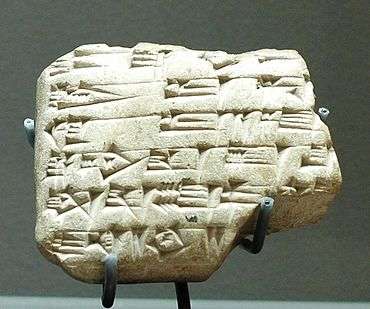Zimri-Lim
| Mari |
 Euphrates • Terqa • Tuttul Royal Palace |
| Kings |
| Yaggid-Lim • Yahdun-Lim Yasmah-Adad Zimri-Lim (Queen Shibtu) |
| Archaeology |
| Investiture of Zimri-Lim Statue of Ebih-Il Statue of Iddi-Ilum |
Zimri-Lim was king of Mari from about 1775 to 1761 BC.
Zimri-Lim was the son[1] or grandson[2] of Iakhdunlim, but was forced to flee to Yamkhad when his father was assassinated by his own servants during a coup. The city was occupied by Shamshi-Adad I, the king of Assur, who put his own son Yasmah-Adad on the throne. Shortly after the death of Shamshi-Adad I, Zimri-Lim returned from exile and was able to oust Yasmah-Adad from power with the help of Yarimlim, the king of Yamhad.
Zimri-Lim ruled Mari for about thirteen years, and campaigned extensively to establish his power in the neighbouring areas along the Euphrates and the Khabur valley. He extended his palace in the city, which was possibly the largest at the time, and certainly the envy of other kings.
He was also active on a wider stage, and at one time (perhaps about 1764 BC) was allied with Hammurabi in his wars against Eshnunna.
Zimri-Lim's personal life is partly known through tablets preserved in the state archive of Mari. He married Shibtu, a princess of Yamkhad (Aleppo and surrounding territory), and is known to have had at least eight daughters through various wives. Several of his daughters were married to rulers of local towns, and two others are known to have become priestesses. Correspondence between the king and his daughters provides evidence that Zimri-Lim thought highly of women and considered them competent at making decisions.
In 1762 BC, Hammurabi conquered and sacked Mari (though it may be that the city had surrendered without a fight), despite the previous alliance. At this time Zimri-Lim disappears from historical view, and is presumed to have been killed.
See also
| Wikimedia Commons has media related to Zimrilim. |